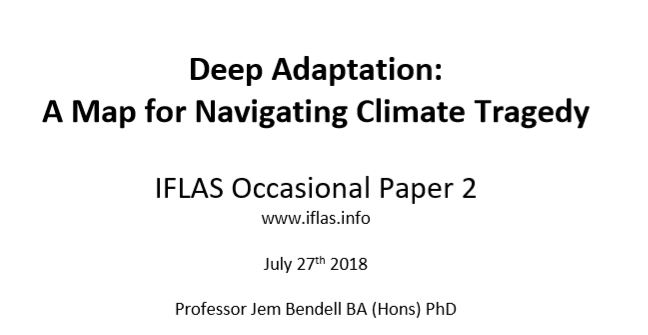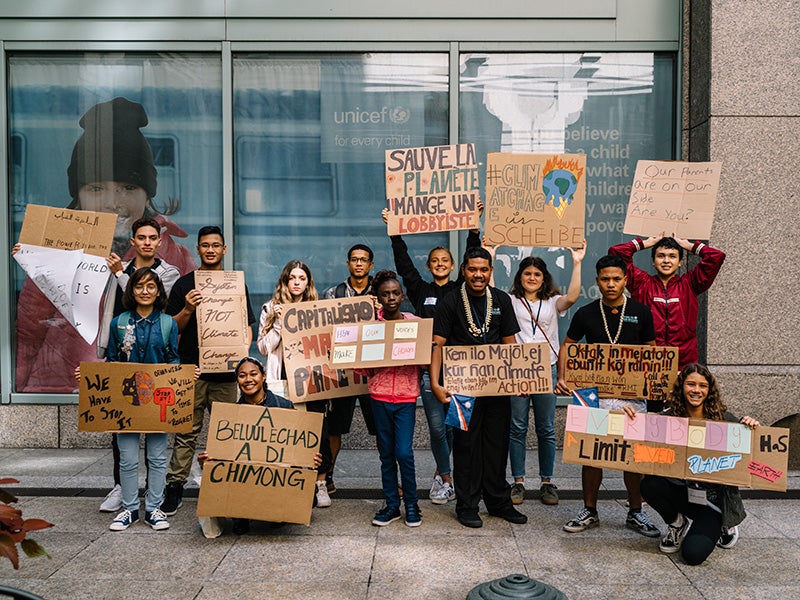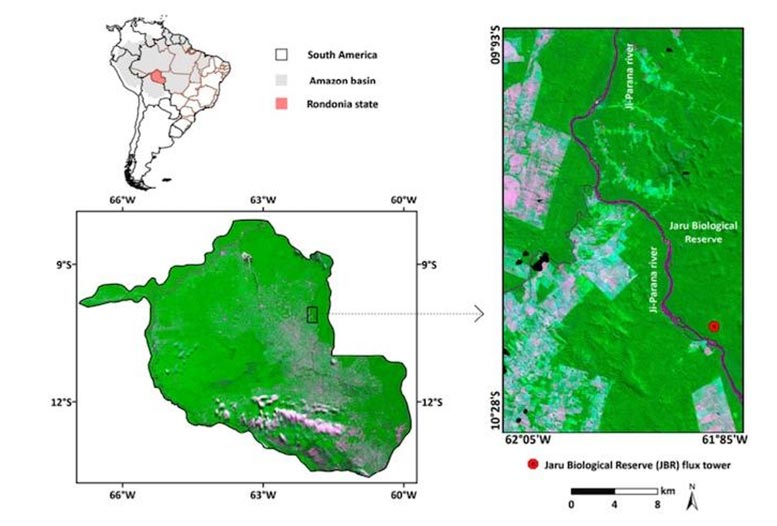More than 700 people have been arrested in civil disobedience actions as the group Extinction Rebellion kicked off two weeks of protests in 60 cities worldwide, demanding urgent government action on the climate crisis. Its members have superglued themselves to government buildings, occupied public landmarks, shut down roads and taken to the streets to sound the alarm about the impending catastrophe of global warming. Extinction Rebellion, a nonpolitical movement, launched last year in the U.K. and rose to prominence in April, when it disrupted traffic in Central London for 11 days. For more about the significance of the coordinated global protests, we speak with Extinction Rebellion co-founder Gail Bradbrook.
Following what goes on with oil and gas exploitation in and around Adrian, Michigan since 2013 - and how these events in our little city connect to the global environmental situation... - with the occasional sidetrack to other related environmental issues in Lenawee county, Michigan and how those relate to global issues.
Tuesday, October 8, 2019
The study on collapse they thought you should not read – yet
Posted by jembendell on July 26, 2018
A research paper concluding that climate-induced collapse is now inevitable, was recently rejected by anonymous reviewers of an academic journal.
It has been released directly by the Professor who wrote it, to promote discussion of the necessary deep adaptation to climate chaos.
“I am releasing this paper immediately, directly, because I can’t wait any longer in exploring how to learn the implications of the social collapse we now face,” explained the author Dr Bendell, a full Professor of Sustainability Leadership. 

In saying the paper was not suitable for publication, one of the comments from the reviewers questioned the emotional impact that the paper might have on readers. “I was left wondering about the social implications of presenting a scenario for the future as inevitable reality, and about the responsibility of research in communicating climate change scenarios and strategies for adaptation.” wrote one of the reviewers. “As the authors pointed out, denial is a common emotional response to situations that are perceived as threatening and inescapable, leading to a sense of helplessness, inadequacy, and hopelessness and ultimately disengagement from the issue…”
Nature Doesn’t Do Deals – why we rise on climate
Posted by jembendell on October 5, 2019
It is easy to pick holes in it. We can question tactics, timing, scope or messaging. But climate activism works. Over the past year, non-violent activism has increased awareness of climate change, so that many politicians now refer to it as the emergency that it is. Yet within a toxic economic system that requires us to borrow and grow forever, and a toxic media system that misleads us about what to blame and whom to hate, it isn’t surprising that rising awareness has not delivered change in our environmental impact. Nor has it triggered inquiry into why we got into this mess and how we might prepare as the climate gets worse for human habitation.
It is why we go again. This month, the non-violent civil disobedience campaign to demand government action on the climate and ecological emergency is calling on #EverybodyNow to take to the streets.

Some commentators in the UK, where the movement began, are asking whether now is the right time for disruptive tactics. But Extinction Rebellion has become a global movement that is rising again this month. It started in London, and Brits are playing a key role in waking up humanity, so can’t step down because of the current performance of our government. Our climate isn’t waiting for Brexit – or any political squabble. Whether wanting to leave or remain in the EU, all Britons want to eat well. After the rise of climate activism in 2019, British MPs admitted the country faces a food security crisis. Extreme weather has been damaging both domestic and foreign food production and increasing the risks that simultaneous crop failures in key exporting countries could make prices shoot up to unprecedented levels.
Extreme rainfall is another sign of the destabilising climate, with 150 flood alerts issued for the UK for the weekend before the #InternationalRebellion. More scientists are admitting publicly that they have been too cautious, partly because they were seeking to be relevant to mainstream policy makers. Climatologist Dr Wolfgang Knorr explains that such scientists should be the first to admit failure, recognise how scientists norms of communication have been counter-productive – and consider direct action to promote social and political change.
Continue reading at: https://jembendell.com/2019/10/05/nature-doesnt-do-deals-why-we-rise-on-climate/
It is easy to pick holes in it. We can question tactics, timing, scope or messaging. But climate activism works. Over the past year, non-violent activism has increased awareness of climate change, so that many politicians now refer to it as the emergency that it is. Yet within a toxic economic system that requires us to borrow and grow forever, and a toxic media system that misleads us about what to blame and whom to hate, it isn’t surprising that rising awareness has not delivered change in our environmental impact. Nor has it triggered inquiry into why we got into this mess and how we might prepare as the climate gets worse for human habitation.
It is why we go again. This month, the non-violent civil disobedience campaign to demand government action on the climate and ecological emergency is calling on #EverybodyNow to take to the streets.

Some commentators in the UK, where the movement began, are asking whether now is the right time for disruptive tactics. But Extinction Rebellion has become a global movement that is rising again this month. It started in London, and Brits are playing a key role in waking up humanity, so can’t step down because of the current performance of our government. Our climate isn’t waiting for Brexit – or any political squabble. Whether wanting to leave or remain in the EU, all Britons want to eat well. After the rise of climate activism in 2019, British MPs admitted the country faces a food security crisis. Extreme weather has been damaging both domestic and foreign food production and increasing the risks that simultaneous crop failures in key exporting countries could make prices shoot up to unprecedented levels.
Extreme rainfall is another sign of the destabilising climate, with 150 flood alerts issued for the UK for the weekend before the #InternationalRebellion. More scientists are admitting publicly that they have been too cautious, partly because they were seeking to be relevant to mainstream policy makers. Climatologist Dr Wolfgang Knorr explains that such scientists should be the first to admit failure, recognise how scientists norms of communication have been counter-productive – and consider direct action to promote social and political change.
Continue reading at: https://jembendell.com/2019/10/05/nature-doesnt-do-deals-why-we-rise-on-climate/
Thursday, September 26, 2019
(97) A #NatureNow message from Greta Thunberg. - YouTube
#NatureNow, a new short film narrated by Greta Thunberg and political journalist, author and activist George Monbiot, serves as a call to action to protect, restore and fund #NaturalClimateSolutions. Credits: Tom Mustill/ www.grippingfilms.com
(97) A #NatureNow message from Greta Thunberg. - YouTube
(95) WATCH: Greta Thunberg's full speech to world leaders at UN Climate Action Summit - YouTube
Swedish climate activist Greta Thunberg chastised world leaders Monday, Sep. 23, for failing younger generations by not taking sufficient steps to stop climate change. "You have stolen my childhood and my dreams with your empty words," Thunberg said at the United Nations Climate Action Summit in New York. "You're failing us, but young people are starting to understand your betrayal. The eyes of all future generations are upon you. And if you choose to fail us, I say we will never forgive you," she added. Thunberg traveled to the U.S. by sailboat last month so she could appear at the summit. She and other youth activists led international climate strikes on Friday in an attempt to garner awareness ahead of the UN's meeting of political and business leaders.
(95) WATCH: Greta Thunberg's full speech to world leaders at UN Climate Action Summit - YouTube
(95) WATCH: Greta Thunberg's full speech to world leaders at UN Climate Action Summit - YouTube
16 Young People File UN Human Rights Complaint on Climate Change | Earthjustice
Youth petitioners take fight for global climate change action to the United Nations Committee on the Rights of the Child
SEPTEMBER 23, 2019
New York, NY — Today, 16 young people from around the world submitted a groundbreaking legal complaint about climate change with the United Nations Committee on the Rights of the Child. Their petition shows how five regional leaders and G20 members — Respondents Argentina, Brazil, France, Germany, and Turkey — have known about the risks of climate change for decades. Despite that knowledge, they are failing to curb emissions, while continuing to promote fossil fuels. The climate crisis was caused and is being perpetuated by the actions and inactions of all states, but without the leadership of the respondents, the global effort to solve the climate crisis cannot succeed.
The youth petitioners are between the ages of eight and 17 and hail from Argentina, Brazil, France, Germany, India, Palau, Marshall Islands, Nigeria, South Africa, Sweden, Tunisia, and the United States. Among the petitioners is Greta Thunberg, a Swedish student climate activist, who sparked a global youth climate action movement through her Fridays for Future school strikes in 2018. Greta is joined by Alexandria Villaseñor, a fellow American activist who co-founded the U.S. Youth Climate Strike. Alexandria, inspired by Greta, conducted her own Friday climate protests outside of the New York United Nations headquarters. The other petitioners are devoted activists and educators in their own right in their home countries.

In making their complaint, the authors narrate the impact climate change has had on their own lives, including brushes with death and loss of neighbors from wildfire or flooding; threats to traditional ways of life such as reindeer herding or fishing; significant health hazards such as dengue fever, malaria, and asthma; hardships from drought, air quality, and poisoned marine life; and mental anxiety or depression about the present and future.
Continue reading at: 16 Young People File UN Human Rights Complaint on Climate Change | Earthjustice
SEPTEMBER 23, 2019
New York, NY — Today, 16 young people from around the world submitted a groundbreaking legal complaint about climate change with the United Nations Committee on the Rights of the Child. Their petition shows how five regional leaders and G20 members — Respondents Argentina, Brazil, France, Germany, and Turkey — have known about the risks of climate change for decades. Despite that knowledge, they are failing to curb emissions, while continuing to promote fossil fuels. The climate crisis was caused and is being perpetuated by the actions and inactions of all states, but without the leadership of the respondents, the global effort to solve the climate crisis cannot succeed.
The youth petitioners are between the ages of eight and 17 and hail from Argentina, Brazil, France, Germany, India, Palau, Marshall Islands, Nigeria, South Africa, Sweden, Tunisia, and the United States. Among the petitioners is Greta Thunberg, a Swedish student climate activist, who sparked a global youth climate action movement through her Fridays for Future school strikes in 2018. Greta is joined by Alexandria Villaseñor, a fellow American activist who co-founded the U.S. Youth Climate Strike. Alexandria, inspired by Greta, conducted her own Friday climate protests outside of the New York United Nations headquarters. The other petitioners are devoted activists and educators in their own right in their home countries.

Youth petitioners display their signs before marching in the Sept. 20 Global Climate Strike in New York City.
In making their complaint, the authors narrate the impact climate change has had on their own lives, including brushes with death and loss of neighbors from wildfire or flooding; threats to traditional ways of life such as reindeer herding or fishing; significant health hazards such as dengue fever, malaria, and asthma; hardships from drought, air quality, and poisoned marine life; and mental anxiety or depression about the present and future.
Continue reading at: 16 Young People File UN Human Rights Complaint on Climate Change | Earthjustice
Friday, September 20, 2019
Deeper Insight Into 2019 Fires From Satellite Study of Amazon Rainforest
Throughout August and early September 2019, media around the world have reported on the extensive forest fires ravaging Brazil’s Amazon rainforest. Much of the concern stems from the Amazon’s significance to regulating the world’s climate. According to the Associated Press, the Amazon absorbs 2 billion tons of carbon dioxide every year — about 5% of global emissions. Thus, fires in the region eat away at this carbon-absorbing capacity while at the same time adding carbon to the air through burning.

A recent study in the peer-reviewed journal Ecohydrology headed by University of Kansas researcher Gabriel de Oliveira gives important context to the fires burning big swaths of the Amazon today, most of which were set intentionally by farmers and ranchers to convert forest into land suitable for grazing animals or growing crops. The researchers sought to discover how these changes to land cover affect the exchange of water and heat between the surface of the Amazon and the atmosphere overhead.
Continue reading at: Deeper Insight Into 2019 Fires From Satellite Study of Amazon Rainforest

This map shows the study area and location of the flux tower used.
A recent study in the peer-reviewed journal Ecohydrology headed by University of Kansas researcher Gabriel de Oliveira gives important context to the fires burning big swaths of the Amazon today, most of which were set intentionally by farmers and ranchers to convert forest into land suitable for grazing animals or growing crops. The researchers sought to discover how these changes to land cover affect the exchange of water and heat between the surface of the Amazon and the atmosphere overhead.
Continue reading at: Deeper Insight Into 2019 Fires From Satellite Study of Amazon Rainforest
Subscribe to:
Comments (Atom)
